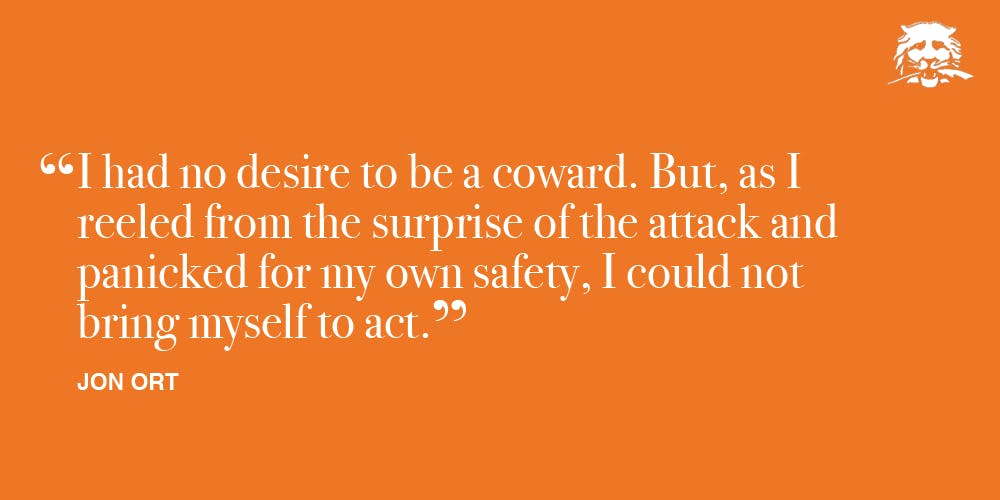My blood ran cold as I watched the man smash his fist into his victim’s face. The other man crumpled to the floor, but the assailant continued to strike. I was terrified. This was neither a scene from an action movie nor a training simulation. It was real-life violence, unfolding before my eyes.
***
Last summer, like all matriculating students, I sat through “Not Anymore!,” the online program that Princeton uses to train students “to prevent sexual assault, dating and domestic violence.” I watched the videos, aced the quizzes, and received my certification of completion. Since I fancied myself capable of helping someone in need, I gave the training no further thought, except to promise myself that I would “do the right thing” in the future. I felt ready to stop any danger that I might encounter on the Street or otherwise.
All of that disappeared on a recent Thursday night. My New York to Princeton train was delayed by a signaling glitch, and I did not leave Penn Station until 12:30 in the morning. I had never been on public transit so late at night, much less alone.
On the train, I slumped in my seat, frustrated as we encountered further delays. Around two in the morning, a young man in a plaid shirt interrupted my vapid stare out the window. He sat several rows away and introduced himself as Jason, a senior at Rutgers University.
As we conversed, a stout man with several days of stubble, sitting in the window seat across the aisle, grew agitated. His mouth twitched beneath bloodshot eyes. He accused Jason of provoking him and demanded, “What are you pointing at?” His female partner, in the other aisle seat, gestured that he should be quiet, and he fell silent. Jason and I continued our conversation.
Without warning, the man wriggled over his partner and leaped into the aisle. He straightened up and punched Jason across the face. He wrestled Jason to the floor and began beating him.
Within seconds, a burly man in a t-shirt and jeans rushed between the two, pulling the assailant off my new friend. He demanded an explanation from the attacker, who insisted he had been provoked. He grumbled some unintelligible curse, gathered his belongings, and walked into another train car with his partner. The other man turned back to the frightened passengers, including me, and identified himself as an off-duty police officer. Jason, face flushed and breath heavy, joined me at my row. There were lacerations on his temple and collarbone.

As my fellow passengers barraged Jason with questions about what happened, something unconscionable gnawed at me. It was not the spasms of my leg muscles. It was not just shock. It was the knowledge that I had failed to intercede. During the fight, I had risen to my feet but pivoted away. I had exchanged panicked glances with the other passengers as we waited for someone to do something. Fortunately, the off-duty cop picked up my slack. Had he not been there, I can only hope that I would have found the courage to confront the assailant.
The urge to protect oneself from physical harm is, of course, innate. I do not fault myself for reacting viscerally. What disturbed me, though, was the gulf between my expectations and my actions. If someone had posed the fight to me as a hypothetical earlier that day, I would have promised to intervene. I was trained to do so. In retrospect, I realize the “Not Anymore!” videos only taught me to keep an eye on vomiting friends, to separate inebriated couples, to call 9-1-1 in case of alcohol poisoning. They did not prepare me to respond to physical assault beyond campus, where no McCosh nurse or Public Safety officer could come to the rescue.
I had fallen victim to the assumption that I would not encounter violence during my college years. Indeed, Princeton affords a remarkable degree of safety. In its 2017 report, the Department of Public Safety recorded only four instances of aggravated assault on campus or in the vicinity. Yet, even though it occurred beyond campus, the attack snapped me out of my naïve trance.
I had no desire to be a coward. But, as I reeled from the surprise of the attack and panicked for my own safety, I could not bring myself to act. I do not mean to imply that all of my peers would have failed to intercede. Among my fellow students are survivors of domestic violence and other abuse, and perhaps they would be better equipped to handle the situation. Nonetheless, I believe the incident would have paralyzed most Princeton students, as it did me.

The episode illustrated to me how readily we pledge to take brave courses of action. Such complacent promises are all too easy to make when we are ensconced within our bucolic campus, when we consider ourselves certified interveners after a few online videos, when we can picture ourselves as heroes of the day.
Such superficial engagement is not unique to Princeton. Several months ago, President Trump proclaimed that he would have confronted the gunman at Marjory Stoneman Douglas High School. He declared, “I really believe I’d run in there even if I didn’t have a weapon.” I have never heard anything that brims with so much hubris.
To be prepared to respond to violence, we should not delude ourselves. Promising to act in the right way means nothing, because in critical moments, we do not have the luxury to parse “right” from “wrong.” The phrase “active bystander” has become a staple of our lexicons. Do we really understand what those two words ask of us? I had to fail before I could grasp the answer.
Jon Ort is an Associate Opinion Editor of the Daily Princetonian. This piece represents the views of the Associate Opinion Editor only. He can be reached at jaort@princeton.edu.








